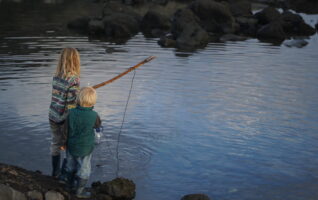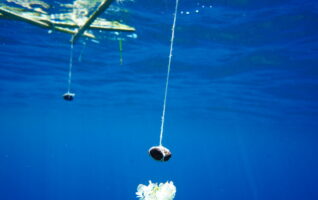Deep-sea mining text & video archive, 2023
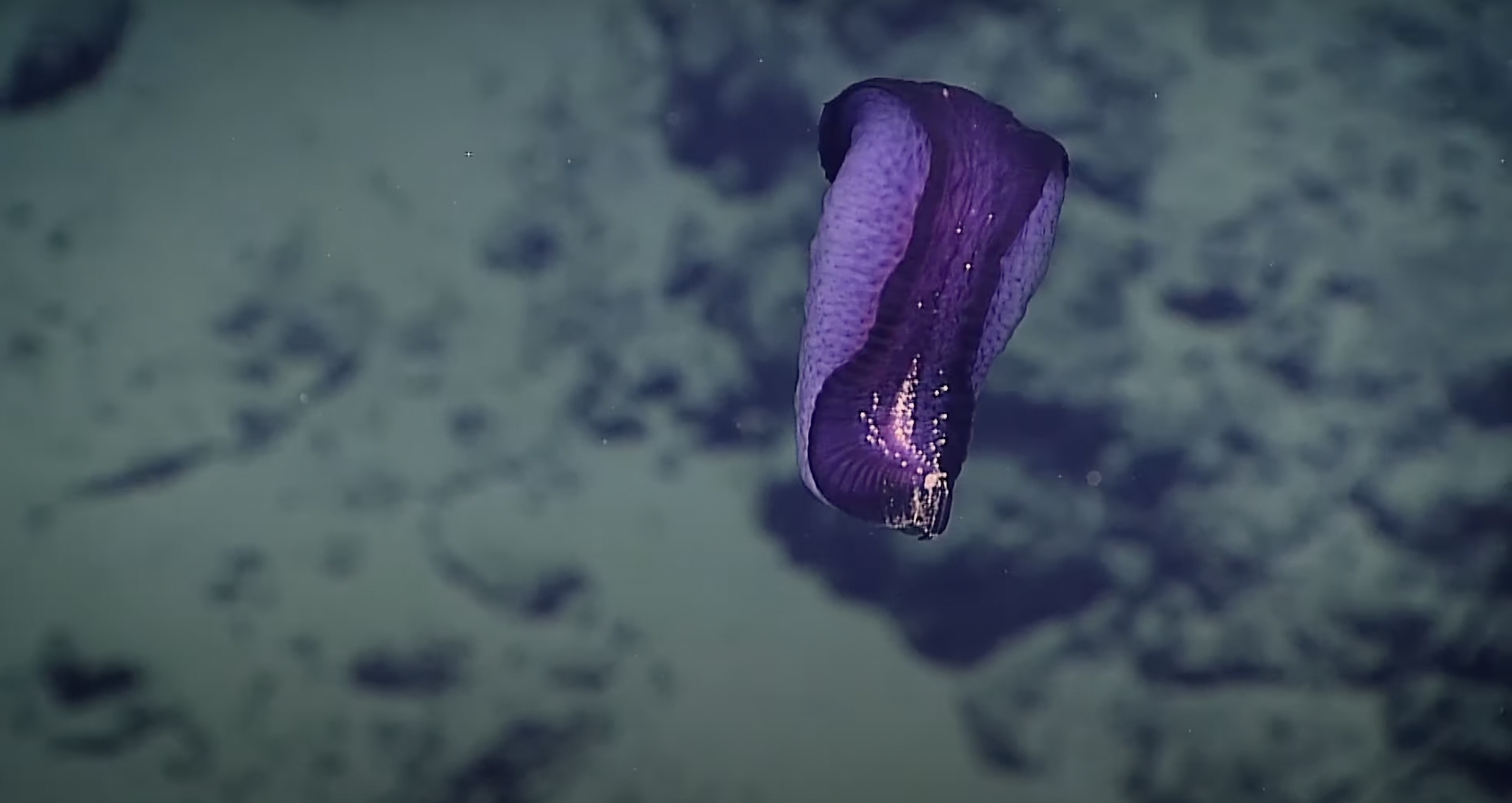 * the photos used in the article preview is a print screen from the documentary In Too Deep.
* the photos used in the article preview is a print screen from the documentary In Too Deep.
We have decided that it would be worth putting together an archive of texts and documentary videos on the issue of deep-sea mining. On this page we will continuously post the texts we come in contact with. We hope that some of the published texts may be of benefit to you as well. If you know of any text that might appear in the selection, please send it to our email address: info@abhpp.org or to our Instagram
News:
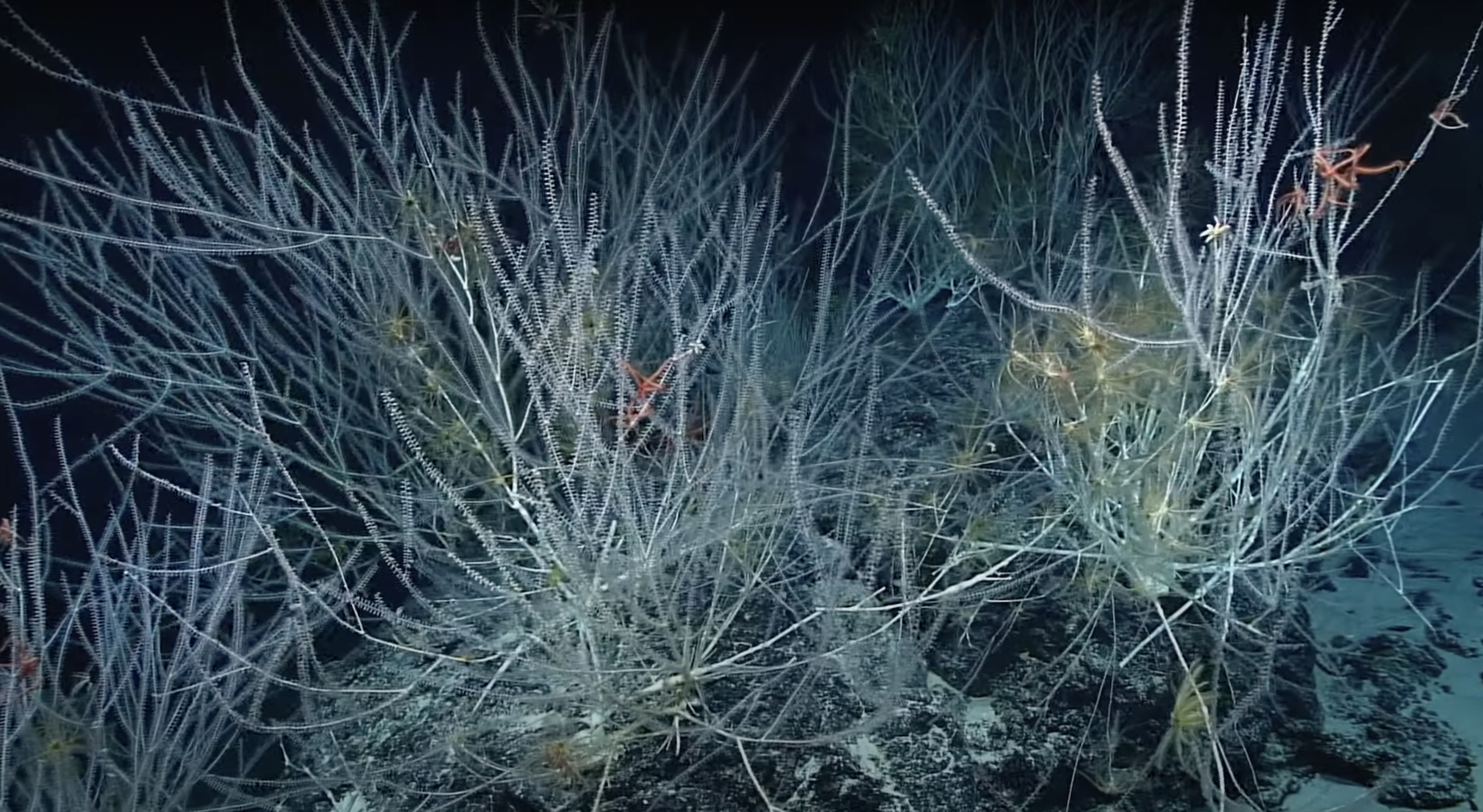
Date: 29. 7. 2023
Source: Twitter, Anne-Sophie Roux
3 weeks of very intense negotiations just ended at the
@ISBAHQ, with some major wins:
- no green-light given to #DeepSeaMining
- regulations delayed with no binding deadline
- discussion on the moratorium planned for 2024
- review of the ISA in 2024
Date: 27. 7. 2023
Source: Twitter, DSCC
At this afternoon session of the #ISA Assembly, Uncle Sol delivered a strong message calling for indigenous voices to be included, acknowledged & incorporated in the decisions being considered: “We are the culture of the people of the #DeepSea, and our culture is intangible.
For us, the #ocean is a sanctuary of life and mining exploitation of the #DeepSea constitutes a violation of its sacred nature as it causes irreversible damage, which will impact on generations to come.” – said Hinano Teavai-Murphy
July 10, 2023 is shaping as D-Day for the world’s oceans.
That is the day after a two-year deadline placed on the International Seabed Authority to finalise mining regulations in seabed areas beyond national jurisdiction is set to expire.
The possibility of mining the seabed being green-lighted in the absence of regulations has caused a lot of uneasiness among member states, environmental groups and the public.
Sebastian Unger, Germany’s Federal Government Commissioner for the Ocean, and Olivier Poivre d’Arvor, the French Ambassador for the Poles and Maritime Issues, tell us why deep-sea mining poses a grave threat to this pristine marine ecosystem.
Deep-Sea Mining: assessing evidence on future needs and environmental impacts
Date: 8. 6. 2023
Source: European Academies Science Advisory Council
Author: European Academies Science Advisory Council
Short description:
The International Seabed Authority (ISA) organises and controls activities related to mineral resources in ‘the Area’ (defined as the seabed, ocean floor, and subsoil beyond the limits of national jurisdiction). The ISA has awarded exploration contracts for minerals in the Area since 2001 and is now developing a mining code for exploitation. While the ISA has the mandate to ensure the effective protection of the marine environment from harmful effects that may arise from mining activities, there is debate about the level of harm that might be caused by mining and whether the draft regulations are robust enough to meet that mandate and provide effective control. Several European countries are sponsors of mining contracts with the ISA and Norway is planning to exploit minerals within its own exclusive economic zone and extended continental shelf.
Policy-makers must thus assess whether economic pressures to extract minerals from the deep sea are compatible with the protection of marine ecosystems and their biodiversity. To inform current debate in the European Union and more broadly, the European Academies’ Science Advisory Council (EASAC) has assessed the implications of the latest science and issued this Statement.
CULTURING THE DEEP SEA…
Date: 5. 6. 2023
Source: Ocean Archive
Author: Mekhala Dave, Fiona Middleton
Short description:
In a new series of Stories, researchers Mekhala Dave and Fiona Middleton pile up the layers of narratives about deep-sea mining, and ask: in the context of a gridlocked discourse, what can culture offer the deep sea?
- First instalment: CULTURING THE DEEP SEA: AN INTRODUCTION
- Second instalment: CULTURING THE DEEP SEA – 2 – GAME CHANGERS: CONSORTIA AND COLLECTIVES
- Third instalment: CULTURING THE DEEP SEA – 3 – WHERE TO DRAW THE (BASE)LINE?
- Related: DEEP-SEA FRAMES: COMMON HERITAGE OF (HU)MANKIND
ITALIAN GOVERNMENT DREAMS OF DESTROYING THE SEABED
Date: 15. 5. 2023
Source: Deep Sea Conservation Coalition, IBI World
Author: IBI World
Short description:
After years of passive and silent participation, Italy decided on 3 May to activate its participation in the International Seabed Authority (ISA). […] The purpose of the visit was to verify the possibility of extending the area in which ISA plans to mine the Mediterranean seabed.
Governments leave door open to deep sea mining starting this year
Date: 31. 3. 2023
Source: Greenpeace International
Author: Elizabeth Claire Alberts
Short description:
Member States to the International Seabed Authority met in Kingston, Jamaica from March 7–31 and failed to address the concerns of scientists around the impacts of this industry and to put a stop to deep-sea mining.
Solomon Kaho’ohalahala, seventh-generation native Hawaiian descendant from the island of Lānaʻi and observer to the ISA negotiations said: “Our heritage and responsibility is to care for our ancestors that precede us and give us life. Therefore we must protect the deep seas as the place of our creation. It is our deep past, our present and the path of our future. It is our country and no one should destroy the place of our creation. It is our aboriginal Hawaiian cultural heritage, identity, tradition and source. It cannot be ignored by the ISA and disregarded in its irresponsible actions to intrude in my creation and for humankind”.
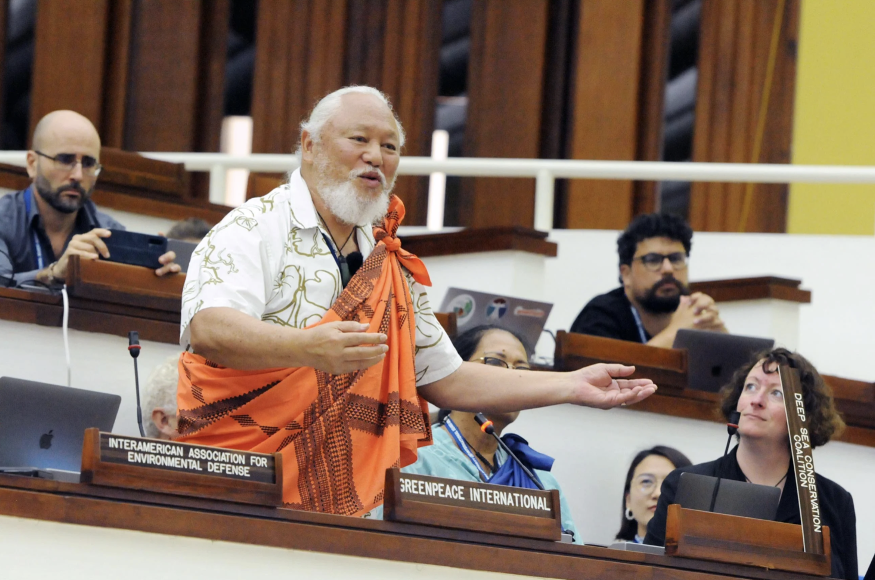 Solomon “Uncle Sol” Kaho‘ohalahala, Maunalei Ahupua‘a/Maui Nui Makai Network offering a traditional Hawaiian oli (chant) at the March 2023 International Seabed Authority meetings for the 28th Session to welcome all who had traveled far for peaceful discussions. Photo by IISD/ENB | Diego Noguera
Solomon “Uncle Sol” Kaho‘ohalahala, Maunalei Ahupua‘a/Maui Nui Makai Network offering a traditional Hawaiian oli (chant) at the March 2023 International Seabed Authority meetings for the 28th Session to welcome all who had traveled far for peaceful discussions. Photo by IISD/ENB | Diego Noguera
“The deep sea mining industry will keep using every trick in the book to get its mechanical teeth into the ocean floor – supported by the so-called regulator. Despite growing politicians saying the industry must be stopped from starting, governments’ hesitant approach at the International Seabed Authority is totally inadequate. If they don’t take action, they’ll sleepwalk into a future where they let deep sea mining happen”, said Casson.
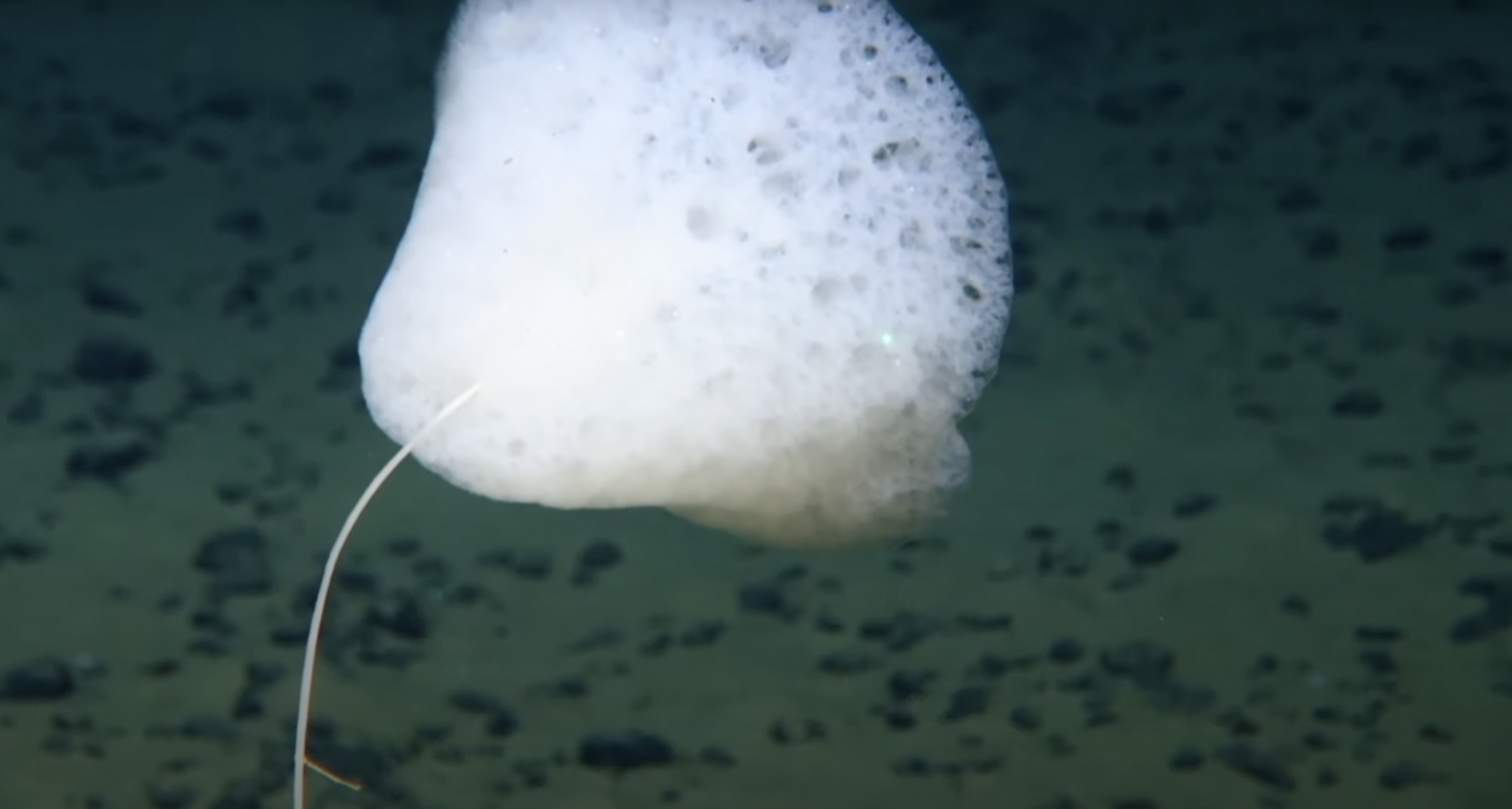
Texts:
You can’t mine the seabed without proper rules
Date: 5. 7. 2023
Source: 360info
Author: Pradeep Singh
Short description:
Mining the seabed without proper regulations seems outlandish. But it could happen sooner than we think. July 10, 2023 is shaping as D-Day for the world’s oceans. That is the day after a two-year deadline placed on the International Seabed Authority to finalise mining regulations in seabed areas beyond national jurisdiction is set to expire. The possibility of mining the seabed being green-lighted in the absence of regulations has caused a lot of uneasiness among member states, environmental groups and the public.
CULTURING THE DEEP SEA: AN INTRODUCTION
Date: 5. 6. 2023
Source: Ocean Archive
Author: Mekhala Dave, Fiona Middleton
Short description:
In a new series of Stories, researchers Mekhala Dave and Fiona Middleton pile up the layers of narratives about deep-sea mining, and ask: in the context of a gridlocked discourse, what can culture offer the deep sea?
‘Culturing the deep sea’ is an experimental written series that feels for the boundaries of scientific–legal knowledge clusters as they relate to deep-sea mining, by inviting many voices and questioning the possibility of deep sea culture – as a process and a common legacy. The series is produced within a broader deep-sea mining project at TBA21–Academy. Part campaign and part programme, the project is designed to respond to the accelerating developments of deep-sea mining by opening channels between art, science and law to welcome the emerging multitude of narratives.
- Second instalment: CULTURING THE DEEP SEA – 2 – GAME CHANGERS: CONSORTIA AND COLLECTIVES
- Third instalment: CULTURING THE DEEP SEA – 3 – WHERE TO DRAW THE (BASE)LINE?
- Related: DEEP-SEA FRAMES: COMMON HERITAGE OF (HU)MANKIND
Is it too late to halt deep-sea mining? Meet the activists trying to save the seabed
Date: 21. 5. 2023
Source: Guardian
Author: Michael Segalov
Short description:
If mining companies are given the go-ahead to exploit the ocean depths, the environmental cost will be devastating. As the clock ticks down to a crucial deadline in July, Michael Segalov reports.
There are certainly signs that it might be possible to stop deep-sea mining before it even starts. Protecting a part of the planet so untouched and unspoiled? It’s the rarest of opportunities. There are positive signs. Weapons manufacturer Lockheed Martin, the industry’s longest-running and biggest player, recently sold off its seabed mining interests. Just last week, major Danish shipping giant Maersk, dropped its investment in a deep-sea mining company, too.
When the ISA was established, little was known about what lived deep in our oceans, or how important these environments were. We now know so much more. No conclusion was come to at the end of this most recent ISA meeting. The can was kicked down the road. Delegations will return this July, with no more room for delay. As a complicated legal battle unfolds, politicians will be faced with a simple question. “And that,” says Casson, “is should the world be bullied into destroying our oceans because a few businesses want to get rich quick based on an outdated rule? Or should global governments wrestle back control? The answer is really obvious.”
AWI Researchers demonstrate High Natural Radioactivity of Manganese Nodules
Date: 17. 5. 2023
Source: Alfred Wegener Institut
Author: AWI Researchers
Short description:
Manganese nodules in the deep sea contain a wealth of valuable metals that are vital to e.g. the electronics and steelmaking industries. Accordingly, these sectors and many countries have pinned their hopes on deep-sea mining to meet the growing demand for raw materials like cobalt and rare-earth elements. In a study just released in the journal Scientific Reports, experts from the AWI show that such activities could not only have ecological impacts, but also pose health hazards, e.g. in connection with the industrial mining and processing of the nodules. According to their findings, in some cases e.g. the radioactivity of radium-226 in the nodules exceeds the safe limit defined in the German Radiation Protection Ordinance one hundred- to one thousand-fold.
Deep sea mining and neocolonialism in the Pacific
Date: 22. 4. 2023
Source: Greenpeace
Author: James Hita
Short description:
The struggle for self-determination in the Pacific is ongoing, with many Pacific island nations continuing to advocate for greater autonomy and control over their resources. However, the push for deep sea mining threatens to further entrench colonial relations and undermine these efforts. It is imperative that the voices and interests of Pacific island nations are prioritised in any decision-making around deep sea mining, rather than the profits and interests of multinational corporations.
Dive Below the Surface: An Introduction to Deep Seabed Mining
Date: 29. 3. 2023
Source: The Ocean Foundation
Author: Madeline Warner
Short description:
Deep seabed mining (DSM) is a potential commercial industry attempting to mine mineral deposits from the seafloor, in the hopes of extracting commercially valuable minerals such as manganese, copper, cobalt, zinc, and rare earth metals. However, this mining is posed to destroy a thriving and interconnected ecosystem that hosts a staggering array of biodiversity: the deep ocean.
DSM is not necessary to transition away from fossil fuels. It is not a smart and sustainable investment. And, it will not result in the equitable distribution of benefits. The mark left on the ocean by DSM will not be brief.
Date: 3. 4. 2023
Source: Society and Space
Author: Amelia Hine, Charity Edwards
Short description:
This short essay underscores how pervasively visual and conceptual constructions take the place of first-hand experience of the deep sea across the world, and identifies where abyssal visualizations are used strategically to create images aimed at influencing broader public conceptions of deep sea mining.
Deep seabed mining lacks social legitimacy
Date: 9. 2. 2023
Source: Nature
Authors: Aline Jaeckel, Harriet Harden-Davies, Diva J. Amon, Jesse van der Grient, Quentin Hanich, Judith van Leeuwen, Holly J. Niner & Katherine Seto
Short description:
The impacts of deep seabed mining on people have not been sufficiently researched or addressed. Using a legitimacy framework, we discuss the social-equity dimensions of this emerging industry in the ocean commons.
Our deep sea is being colonised
Liam Koka‘ua, who has roots in both ‘Avaiki Nui and Aotearoa, in conversation with Teuila Fuatai.
Date: 2. 4. 2023
Source: e-tangata
Author: Liam Koka’ua
Short description:
Mining deep areas of the ocean to gather rare metals for electric car batteries and other green technologies is attracting cash-strapped Pacific island governments.
Exploration is now under way in the waters around the Cook Islands — or ‘Avaiki Nui, as the islands are known among those who reject its colonial name — for sites with potential for deep-sea mining.
While the country’s leaders are enthusiastic, there are many who say it’s simply extractive colonisation all over again.
Geographies of deep sea mining: A critical review
Date: 7. 3. 2022
Source: ScienceDirect
Author: John Childs
Short description:
Commercial deep sea mining (DSM) stands at a threshold as both national and global legal regimes seek to move beyond exploration of the seabed towards its exploitation. As an emerging political issue that takes place in complex geographies that are not always accounted for by science, deep-sea mining demands critical attention. It is against this background that this paper aims to highlight work that foregrounds these different geographies and actors that together shape the politics of DSM. As it emerges as a political reality in the Anthropocene, it asks what geographies are implicated and why do they matter? It highlights scholarship that has explored both the human and more-than-human dimensions and relations of DSM and argues for a broad range of thinking that is appropriate to the complex deep-sea environments being targeted for extraction.
Date: 3. 7. 2022
Source: Springer
Author: Marta Conde, Aletta Mondré, Kimberley Peters & Philip Steinberg
Short description:
In spite of a proliferation of academic and policy-oriented interest in deep sea mining (DSM), this paper argues that two underlying questions remain underexplored. The first relates to what exactly the seabed is; the second to who the stakeholders are. It is argued that a greater interrogation of how the seabed is defined and understood, and a deeper consideration of how stakeholders are identified and the politics of their inclusion, is crucial to the enactment of policy and planning techniques. Through the analysis of current regulations to govern DSM in both national and international jurisdictions, this paper critically examines these seemingly banal but vital questions in different contexts. It is contended that most regulations are ‘fuzzy’ when it comes to addressing these questions, with the result that different understandings of the seabed and the implications of mining are ignored and that who stakeholders are and how they are defined causes many relevant voices to be unheard. It is argued, therefore, that it is imperative to address these often-overlooked questions directly in order to inform future seabed policy and governance.
Indigenous peoples from 34 nations call for total ban on deep sea mining
Date: 22. 3. 2023
Source: Greenpeace,
Author: James Hita
Short description:
Indigenous activists have made clear that they don’t give their consent to deep sea mining. In a petition presented today to the ISA, over 1,000 signatories from 34 countries and 56 Indigenous groups called for a total ban on this destructive industry.
Indigenous activists, scientists and leaders from across the world have come forward in one voice at the ISA meeting in Jamaica. Drawing attention to the flaws in ‘Western culture’s relationship with natural ecosystems’, they called for an effective and total ban on deep-sea mining.
Deep-sea mining for rare metals will destroy ecosystems, say scientists
Date: 26. 3. 2023
Source: Guardian
Author: Robin Mckie
Short description:
An investigation by conservationists has found evidence that deep-seabed mining of rare minerals could cause “extensive and irreversible” damage to the planet.
Wildlife charity Flora and Fauna have released a comprehensive and influential paper, outlines scientific concerns that deep-sea mining would “cause widespread pollution, destroy global fish stocks and obliterate marine ecosystems”. The report also emphasises how little we understand about the deep-sea and how crucial further research is.
The Guardian view on the UN ocean treaty: arriving just in time
Date: 9. 3. 2023
Source: Guardian
Author: Guardian – ed.
Short description:
In his 1968 essay The Tragedy of the Commons, the ecologist Garrett Hardin argued that resources which do not clearly belong to anyone are likely to be overexploited, since protecting them is in no one person’s interest. That tragedy is unfolding on the high seas – the two-thirds of the ocean that lies beyond coastal states’ national jurisdiction. This is a commons, where fishing and mining have been opened to all. The result is serious damage to a vital resource that covers almost half the planet’s surface. The high seas are not entirely lawless. Yet only a tiny fraction of these waters are protected from exploitation, despite harbouring the world’s marine wilderness and its unique biodiversity.
One deep sea mine could send noise 500km across the ocean
Date: 8. 7. 2022
Source: Guardian
Author: Karen McVeigh
Short description:
Many deep-sea species – about which very little is known – are believed to use sound to navigate and communicate, as scientists call for limits on mining
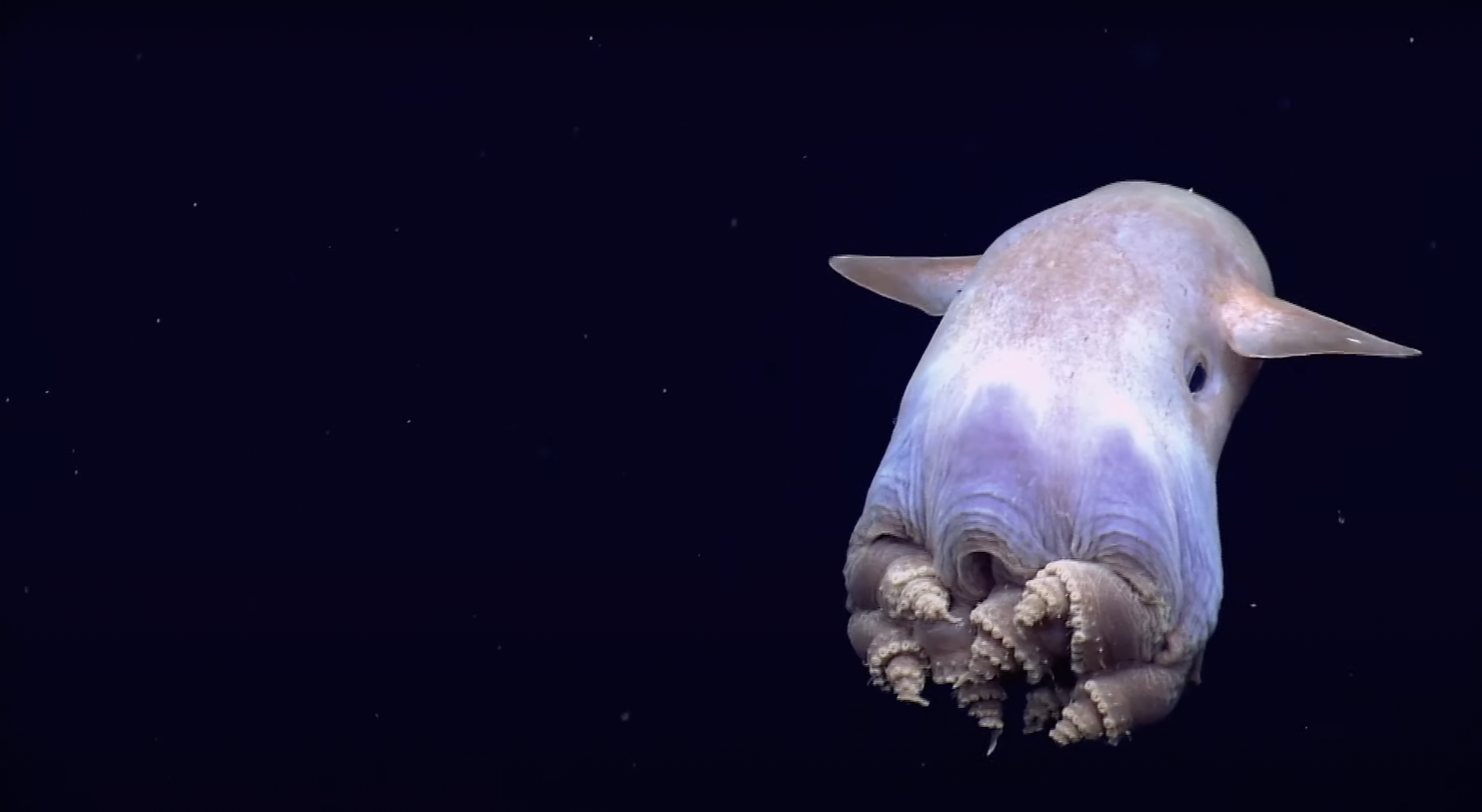
Documentary films:
Session 1: Prologue_ Towards a common heritage for a allkind
Source: TBA-21 Academy
Author: TBA-21 Academy
Short description:
In the first half of October 2023, the Ocean/Uni Autumn Semester, dedicated to the theme of Deep Sea Cultivation, was launched. Here is the record of the first meeting, which took place on October 11, 2023.
When the deep Ocean is a place that largely remains an idea, how can geographic and conceptual distance be overcome? How do we approach law as a media, critically assessing its sedimented principles, and using cultural practices to directly involve the Ocean as a collaborator rather than an object?)
Blue Peril: a visual investigation of deep sea mining in the Pacific
Source: nodeepseamining
Author: nodeepseamining
Short description:
Blue Peril is a 16-minute visual investigation that presents a scientifically robust and disturbing picture of the far-reaching impacts of deep sea mining on Pacific Island communities. There are serious implications for Pacific Island economies and way of life – with Hawaii and Kiribati predicted to be in the firing line.
Accompanied by detailed technical notes, Blue Peril uses the best available data and internationally accredited oceanographic models to present independent, scientifically valid predictions of how far-reaching the impacts of deep sea mining in the Pacific Ocean are likely to be.
Blue Peril builds on the Deep Sea Mining Campaign reports (see below), Predicting the impacts of mining deep sea polymetallic nodules in the Pacific Ocean (2020) and Why the Rush: seabed mining in the Pacific Ocean (2019), using architectural and spatial analysis to present a ground-breaking simulation of the potentially irreversible impacts of deep sea mining in the Pacific Ocean.
Perhaps the most alarming prediction that Blue Peril makes is that it would take only 3 months for the waste discharged by The Metals Company in its Tonga Licence area to reach Hawaiian waters and the Northern Line Islands of Kiribati and the United States.
Source: Ocean Archive
Author: Emma Critchley
Short description:
Common Heritage’ is an urgent response to the rush of deep-sea mining for rare earth minerals, exposing how reverberant layers of industrialisation, colonialism and territorial claim have affected the way we relate to our environment. Highlighting the fantasies we construct and investigating the relationship between exploration and exploitation, the film draws into focus how these romanticised stages are in fact borders of conquest, annexed for geopolitical territory appropriation and mineral resources. In 1967, Arvid Pardo, the Maltese Ambassador to the UN gave a speech, which instigated the Common Heritage of Mankind principle and after 10 years of international conference and debate, bore the Law of the Sea treaty. Pardo’s speech, narrated by science fiction writer, Gwyneth Jones, is the provocation for the film. The story draws from a web of press conferences, interviews and speeches, which unfold to reveal the tensions and contradictions in the attempted governance of such a vast and powerful landscape and the continual disputes that probe the edges of law and territorial demarcation. Dystopian science fiction motifs are harmonised with a poetic montage of deep-sea exploration archive footage. This juxtaposition both questions our current state and our future engagement with this critical frontier.
In Too Deep, 2023
Source: YouTube
Author: The Deep Sea Conservation Coalition
Short description:
The Deep Sea Conservation Coalition filter the murky waters of deep-sea mining and ask, do we really need to mine the deep ocean?
Join leading ocean scientists, policy experts and activists including Dr Diva Amon, Professor Dan Laffoley, Maureen Penjueli, Farah Obaidullah and Matthew Gianni as well as Claudia Becker, a senior BMW expert in sustainable supply-chains for an unmissable exploration of the new threat facing the deep sea.
Deep-sea mining: The Azores Case, 2019
*For Sea-Water Amplification, the Azores is an important location because it is a location where we live and at the same time develop our ocean exploration activities.
Source: Inhabitants
Short description:
The third episode of the web series What is Deep Sea Mining? is set on the Azores archipelago, an autonomous region of Portugal located in the North Atlantic Ocean. Composed of nine volcanic islands that once thrived on the whaling industry, the Azores have since become a hot spot for research in marine biology due to its diverse ecosystems, as it is located above an active triple junction between the Eurasian, African, and North-American tectonic plates.
In 2008, one year before Portugal submitted its proposal to extend its continental shelf to the United Nations, the Canadian mining company Nautilus Minerals Inc. presented a proposal for mineral prospection and exploration in six areas off the coast of the Azores. Despite the fact that deep sea mining continues to be under debate between different governmental bodies, no effort was done to inform the wider public or local citizens about such plans.
For this episode we interviewed different specialists in marine biology based in the islands, among them José Nuno Gomes-Pereira, Teresa Cerqueira, Telmo Morato, and Gisela Dionísio, as well as member of the European Parliament Ricardo Serrão Santos, on the potential impacts of deep sea mining on local ecosystems and on the archipelago’s economical reality.
Deep Sea Mining and Impacts in the Azores – Louisa Casson Soundbites, 2019
Source: Greenpeace
Short description:
Greenpeace campaigner, about deep sea mining and its impacts in the Azores. Greenpeace is in the Azores during the “Protect the Oceans” tour, an almost year-long pole to pole voyage from the Arctic to the Antarctic – to highlight the many threats facing the oceans and to campaign for a Global Ocean Treaty covering all seas outside of national waters.
Greenpeace Media Archive – Azores, 2022
What is Deep Sea Mining? Episode 5: The Pacific Precedent
Source: Inhabitants
Short description:
The first deep sea mining tests took place in the Pacific in 2015, in the territorial waters of Papua New Guinea. This has brought strong contestation by local communities, whose lands have been expropriated and whose economy depends on fishing. Resistance by local and indigenous groups has been exemplary in territorial waters of Pacific island nations states, where numerous initiatives – among them PANG and Solwara Warriors – have emerged to inform the population and protect its common resources. While mining itself never began commercially, the mining company’s recent bankruptcy has reportedly left the Papua New Guinea government with a $120 million debt. Now that Pacific nations have seen the exploitative outcome of the corporate Global North’s deep sea mining intentions in Papua New Guinea’s territorial waters, PANG and others are advocating for a deep sea mining ban.
The closing episode of the webseries What is Deep Sea Mining? is narrated by Maureen Penjueli from the Pacific Network on Globalisation (PANG), a regional watchdog, established in 2009, that promoted Pacific peoples’ rights to be self-determining, advocating for free, prior, and informed consent for Indigenous peoples of the Bismarck Sea in accordance with international law. Addressing issues of scale, political representation, and resource politics, Penjueli reiterates the importance of the oceans’ role in securing the carbon equation and contributing to planetary resilience. As such, she calls for the possibility of making politics from an oceanic point of view, that learns from the Pacific Nation’s perspective.

